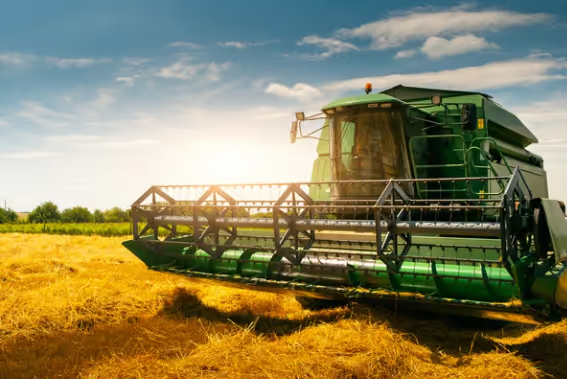As harvest season approaches, ensuring that your farm equipment is in top shape is crucial for the smooth operation of your agricultural operations. Regular equipment maintenance not only extends the lifespan of your machinery but also reduces downtime and repair costs. In this blog, we'll explore essential maintenance tips for various types of harvest equipment, emphasizing preventative maintenance and effective management systems to keep your farm operations running smoothly.
Importance of Regular Maintenance for Harvest Equipment
Proper maintenance of harvest equipment, such as tractors, spreaders, and other farm machinery, is key to avoiding unexpected breakdowns during the busy harvest season. Downtime due to equipment failure can significantly impact farm operations, leading to delays and increased costs. By following a consistent maintenance schedule and performing thorough inspections, farmers can detect early signs of wear and tear and address potential issues before they escalate.
1. Create a Comprehensive Maintenance Schedule
A well-planned maintenance schedule is the cornerstone of effective farm equipment maintenance. Start by organizing all maintenance tasks according to each piece of equipment's specific needs. The schedule should include routine maintenance activities such as checking oil filters, air filters, tire pressure, and hydraulic fluid levels. Regularly inspect hoses for any signs of damage or corrosion and replace them as needed.
Each type of agricultural equipment will have its own set of maintenance requirements. For example, tractors require more frequent oil and filter changes compared to other equipment. It's crucial to follow the manufacturer’s recommendations for maintenance practices to ensure the equipment remains in working order.
2. Lubrication of Moving Parts
Lubrication is a critical aspect of equipment maintenance, especially for harvest machinery with numerous moving parts. Ensuring all moving parts are well-lubricated prevents friction, reduces wear, and enhances the smooth operation of farm machinery. When lubricating, pay special attention to areas that are prone to dirt and debris build-up, such as pivot points, chains, and bearings.
Lubrication also plays a vital role in preventing corrosion. Weather conditions can accelerate corrosion on agricultural equipment, so it's essential to regularly apply the appropriate lubricants to safeguard against rust and prolong the equipment's lifespan.
3. Monitor Hydraulic Fluid Levels and Hoses
Hydraulic systems are a vital component of most farm equipment, including tractors and spreaders. Low hydraulic fluid levels or damaged hoses can lead to costly breakdowns and downtime during harvest season. As part of your routine maintenance, check hydraulic fluid levels regularly and top them up as needed. Inspect hoses for signs of wear, such as cracks, leaks, or bulges, and replace them immediately if any issues are found.
Maintaining optimal hydraulic fluid levels and ensuring hoses are in good condition are essential for the smooth operation of farm machinery. Neglecting these maintenance tasks can lead to sudden equipment failure and potentially hazardous situations in the field.
4. Check and Replace Air Filters and Oil Filters
Air filters and oil filters play a crucial role in the proper maintenance of farm equipment. Clean air filters are necessary to keep dust and debris from entering the engine, which can cause significant damage. Regularly check air filters and clean or replace them according to the manufacturer’s recommendations.
Oil filters are equally important in ensuring the engine remains free of contaminants. Replace oil filters during oil changes, and keep track of when they were last replaced as part of your maintenance management system. Following these maintenance practices will help maintain the efficiency and longevity of your agricultural equipment.
5. Inspect Tire Pressure and Condition
Proper tire maintenance is often overlooked but is essential for farm equipment maintenance. Incorrect tire pressure can affect the stability and fuel efficiency of tractors and other machinery. Make it a habit to check tire pressure regularly and adjust it according to the manufacturer's guidelines. Additionally, inspect tires for signs of damage, such as cuts or punctures, and replace them if necessary.
Routine maintenance of tires not only ensures safe operation but also reduces the likelihood of accidents in the field, especially when working on uneven terrain or under challenging weather conditions.
6. Focus on Preventative Maintenance
Preventative maintenance is the proactive approach to farm equipment maintenance that can save both time and money in the long run. Regular inspections help identify early signs of wear and potential issues before they turn into major problems. Conduct thorough inspections of all equipment, paying close attention to components that are prone to wear, such as belts, bearings, and hoses.
Implementing a preventative maintenance program for your agricultural operations will not only extend the lifespan of your equipment but also improve its reliability and performance during the harvest season.
7. Store Equipment Properly During Off-Season
Proper storage of farm equipment during the off-season is just as important as routine maintenance. Store equipment in a dry, sheltered area to protect it from harsh weather conditions and prevent rust and corrosion. Cover sensitive parts and components, such as engines and hydraulic systems, to keep them clean and free from debris.
Proper storage practices can significantly reduce repair costs and help maintain the working order of your equipment, ensuring it's ready for use when needed.
8. Implement a Maintenance Management System
For efficient farm operations, it’s beneficial to implement a maintenance management system to keep track of all maintenance activities. This system should include a detailed record of each piece of equipment, the maintenance tasks performed, the dates of service, and any parts replaced. A well-organized management system helps ensure all farm equipment maintenance is up-to-date and aligned with manufacturer’s recommendations.
Using a management system also aids in keeping track of warranties and service agreements, which can be helpful in reducing repair costs and ensuring compliance with maintenance practices.
9. Address Accessibility and Repair Costs
Accessibility to tools, parts, and service facilities is vital for effective equipment maintenance. Make sure that your farm is well-stocked with essential tools and parts needed for regular maintenance and minor repairs. Having quick access to these items can minimize downtime and ensure that any necessary repairs are completed promptly.
Additionally, keep an eye on repair costs and plan for major repairs or replacements well in advance. By budgeting for these expenses and understanding your equipment's maintenance needs, you can better manage farm operations and reduce unexpected financial strain.
Conclusion
Maintaining your harvest equipment in peak condition requires a combination of regular maintenance, proper storage, and proactive management practices. By focusing on lubrication, monitoring hydraulic fluid levels, inspecting hoses and filters, and keeping a detailed maintenance schedule, you can ensure your farm machinery remains in working order throughout the harvest season.
Investing time and effort in preventative maintenance and implementing a robust management system will not only extend the lifespan of your agricultural equipment but also enhance the overall efficiency and productivity of your farm operations. As the harvest season approaches, prioritize equipment maintenance to keep your farm running smoothly and avoid the costly consequences of unexpected breakdowns.




